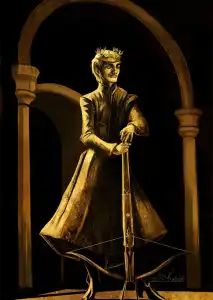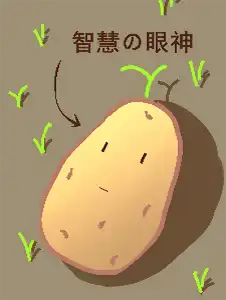Chapter 61 |
Upon seeing the reception desk’s signboard for guidance on fees, I couldn’t help but grimace.
I intended to hold a strong sense of gratitude towards Tomiku Chioharu-sama, but the initial offering fee is 100,000 yen…
100,000 yen, huh…
“Ah, you must be Kyobe-san who made a reservation. We have been expecting you.”
“This is…”
The envelope that Dad took out of his pocket was clearly not as thick as ten bills with Ben Franklin’s face on them.
If it’s only 1 cm thick, there’s probably a million yen inside.
Is this for real? I thought the most expensive option was 100,000 yen, but I guess special blessings go far beyond that.
In this harsh world, they probably have to make money where they can to maintain such a large shrine.
I don’t think I’ll ever get over the financial sense of my previous life.
After my father finished the registration, we went inside the worship hall.
As we walked through, we saw about 10 families participating in a prayer service conducted by a young priest.
If I had been reincarnated into an ordinary household, I would have also been among them, but as someone born into a family of onmyoji, I am to participate in a special prayer ceremony.
We quietly passed by them and moved beyond the signboard that read “Unauthorized Personnel Prohibited.”
“We have been waiting for you, Kyobe-dono. Please, come this way.”
The Shinto priest who greeted us was a middle-aged man who looked to be in his late 40s. He exuded a sense of veteran presence from his plain purple hakama and his demeanor.
Father seemed to know him, and they exchanged business-like greetings as we followed the priest.
As the largest shrine in the area, it is quite large, so the interior of this building is correspondingly spacious.
Although this is a shrine for a minor deity in Japan as a whole, it seems to be more widely worshipped than I had expected.
“This way. Please wait inside until the ceremony begins.”
The place we were guided to was the heiden, located at the back of the main hall. Although structurally connected, they are almost completely separate buildings.
The Heiden is a building where sacred Shinto plaques (called “gohei”) that serve as vessels for the spirits of the Gods are enshrined, and only Shinto priests are allowed to enter during ceremonies.
Thus, my father and I, outsiders who were not supposed to be allowed in, had set foot in this place.
My first impression upon entering the room was that it seemed like a place where a gathering of esoteric Buddhism might be held.
To begin with, the location of this room was like a “secret room built behind the central hall” judging from the sensation of having moved around. That alone was suspicious enough.
The room was simple with no windows, and the smell of tatami mats hung heavy in the air, adding to all of tha is the eerie atmosphere caused by the dim lighting.
Actually, it would be more accurate to say it had a solemn atmosphere. I felt uneasy.
The room was similar to my bedroom in that it was illuminated by four corner lanterns that kept out the outside light.
At the back of the room was a statue of what seemed to be the Goddess Chioharu no Fuai, surrounded by offerings such as rice bales and bolts of cloth, with the shide at the center.
It had an atmosphere of an old-fashioned offering mountain.
In front of it, there were cushions laid out, and three other parent-child pairs were already seated.
“Excuse us.”
We sat down on the cushions, joining the other parents and children who had already gathered.
I looked at the face of the child sitting next to me, and to my surprise, it was someone I knew.
He was one of the talented kids I had spotted at the Abe family social gathering. I think his name is… Sora-kun.
“Long time no see. How have you been?”
“……”
Oh, I guess he doesn’t remember me.
I also vaguely remember your name, so I guess we’re even.
“Thank you for the other day.”
“No, thank you for your help. How have you been since then?”
The parents sitting behind their children were also engaged in small talk.
On the way here, my father borrowed the changing room and changed from his suit to a traditional Onmyoji outfit. It seemed like the other fathers did the same, as the sight of men in hunting clothes and Kari-ginu (traditional Japanese hunting jacket) gathered together was an unusual scene to behold.
As I was pondering how to converse with Sora-kun, whom I assumed was seated beside me, the last group of people who had made reservations arrived.
The Shinto priest who had guided us this far began the final preparations for the prayer. Behind him, a seasoned female Miko (Shinto shrine maiden) in full attire briefly explained the process of the ceremony.
Finally, it seemed like the preparations were complete. The Shinto priest offered his respects to the Goddess statue and turned to face us, beginning his speech.
“I would like to extend my heartfelt congratulations to the five young children gathered here today for their successful emergence into the world. The children of the sun, who protect the order and peace of this world, will always be a treasure, and your birth will be welcomed by all the people. I congratulate you on this joyous occasion.”
To summarize the long speech of the Shinto priest, it goes something like this: “We thank you for being born and wish for your continued healthy growth. Let us greet the gods, albeit a bit late.”
In the Heian period, it was believed that shaving a child’s hair before the age of three would promote healthy hair growth. This practice led to the origin of the Shinto ritual called “Kamioki no Gi,” or the “Hair Cutting Ceremony,” which was performed when a child turned three years old.
However, in contrast to this tradition, families of Onmyoji, who keep their hair long, do not perform the “Shichi-Go-San” ceremony when a child turns three. Instead, they perform a special prayer and offer special offerings when their sons turn five and their daughters turn seven.
First, the Shinto priest recites the purification words (harae kotoba).
Before greeting the Gods, one must purify and cleanse oneself of impurities through the harae ritual.
The priest swings the sacred shide, which is a paper streamer used to ward off evil spirits, while reciting the purification words.
The room is dimly lit, and the priest’s voice and the rustling sound of the shide echo throughout, creating a more ceremonial atmosphere.
Next, the priest will recite the norito, or prayer.
“~~~~~~~~”
What? His voice is so small, so quiet!
The purification words that had been delivered earlier were echoing throughout the room, but the moment the main celebratory words began, the volume of the voice dropped to a murmur.
Could it possibly be something to do with the esoteric or secret arts as they are called in Onmyoji?
I don’t know the details because I was only briefly taught about the Shinto teachings.
However, the ceremony seemed to be proceeding solemnly, and I picked up the tamagushi (sacred skewer) that the priest had prepared for me.
“Kyobe Hijiri.”
“Yes?”
As the children began to get bored, the names of the participating children were called out, as explained in advance.
I answered cheerfully and stepped forward to receive the tamagushi (skewer) from the priest and reverently offer it before the Goddess.
My father’s instructions have helped me perfect my manners in this area.
I must perform the rituals related to the Gods well so as not to be disrespectful.
–God is real.
In my previous life, I did not believe that God existed.
I heard that there were 8 million gods, so I ate rice without leaving any leftovers, asked God for help only when it was convenient, paid a New Year’s visit to a shrine with my family on New Year’s Day, and celebrated Christmas on December 24.
In a sense, I had only the religious beliefs typical of Japanese people, who use miscellaneous religions for events while claiming to be non-religious.
However, being born into the Kyobe family, I have come to believe in the existence of Gods through various experiences.
Although they do not appear, they recognized in the Onmyoji world as higher beings who bestow blessings and prophecies upon humankind.
In the first place, mysterious creatures, spirits, and other things that I thought did not exist can be found walking by the side of the road.
It would not be surprising if Gods existed somewhere, although we have not been able to see them up until now.
Not only me, but other children must have learned how to do this from their parents. They were offering the tamagushi with correct gestures even though they were not very good at it.
According to my father, “The Gods, including Tomiku Chioharu-sama, do not care about the slightest rudeness of human children,” as these things are just a matter of feelings.
So far, this has been an ordinary Shichi-Go-San Ceremony.
The children I saw in the hall of worship would have undergone the same procession.
However, from this point on, things started to be a little different.
For a child born in a family of Onmyoji, the main purpose of the ceremony is the devotion that follows.
T/N – To support me and to read chapters upfront you can visit my – Patreon
T/N – I am also an Amazon affiliate, so if you want to support me you can do it by checking out My Amazon affiliate link – https://amzn.to/3AvZe5L

















